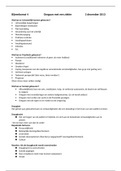-
1. Exam (elaborations) - Module 3 computer concepts exam questions and correct answers, complete verified solu...
-
2. Exam (elaborations) - Module 3 computer concepts exam questions and correct answers, complete solution 2024...
-
3. Exam (elaborations) - Bcis module 1 computer concepts exam questions and correct answers, complete solution...
-
4. Exam (elaborations) - Module #1 computer concepts exam questions and correct answers. complete solution 202...
-
5. Exam (elaborations) - Module 1 exam computer concepts (100%)
-
6. Exam (elaborations) - Module 2 computer concepts exam questions and correct answers, 2024.
-
7. Exam (elaborations) - Module 2 computer concepts exam questions and correct answers, 2024.
-
8. Exam (elaborations) - Business 1305: module 2 computer concepts exam questions and correct answers 2024.
-
9. Exam (elaborations) - Module 4 computer concepts exam questions and correct answers, complete solution 2024...
-
10. Exam (elaborations) - Module 4 computer concepts 2024
-
11. Exam (elaborations) - Module 5 computer concepts exam questions and correct answers, complete solution 2024
-
12. Exam (elaborations) - Computer concepts module 5, module 5 computer concepts exam.
-
13. Exam (elaborations) - Is 116 module 5 computer concepts exam questions and correct answers.
-
14. Exam (elaborations) - Business 1305: module 5 computer concepts exam.
-
15. Exam (elaborations) - Module 5 computer concepts quiz, complete solution.
-
16. Exam (elaborations) - Module 6 computer concepts exam questions and correct answers, complete solution 2024...
-
17. Exam (elaborations) - (combined) module 6 computer concepts exam, computer concepts module 8, computer conc...
-
18. Exam (elaborations) - Module 6 computer concepts quiz, complete solution 2024.
-
19. Exam (elaborations) - Module 7 computer concepts exam questions and correct answers, complete solution 2024...
-
20. Exam (elaborations) - Computer concepts, module 7 exam prep questions and correct answers, 2024.
-
21. Exam (elaborations) - Module 7 computer concepts quiz - concepts10633.
-
22. Exam (elaborations) - (combined) module 7 - computer concepts, computer concepts module 6, all with complet...
-
23. Exam (elaborations) - Module 7 sam training concepts exam questions and correct answers, complete solution ...
-
24. Exam (elaborations) - Module 8 computer concepts exam questions and correct answers, complete solution.
-
25. Exam (elaborations) - Computer concepts module 8 questions and correct answers, complete solution 2024.
-
26. Exam (elaborations) - Module 9 computer concepts exam questions and correct answers, complete solution 2024...
-
27. Exam (elaborations) - Module 10 computer concepts exam questions and correct answers, complete solution.
-
28. Exam (elaborations) - Business 1305: module 10 computer concepts exam questions and correct answers, 2024.
-
29. Exam (elaborations) - Module #10 computer concepts exam questions and correct answers, complete verified so...
-
30. Exam (elaborations) - Module 11 computer concepts exam questions and correct answers. with complete solutio...
-
31. Exam (elaborations) - Business 1305: module 11 computer concepts exam questions and correct answers, 2024.
-
32. Exam (elaborations) - Module 11 computer concepts skills training multiple choice questions and correct ans...
-
33. Exam (elaborations) - Computer concepts, module 12 questions and answers.
-
34. Exam (elaborations) - Computer concepts module 12 questions and correct answers, with complete solution.
-
35. Exam (elaborations) - Module #13 computer concepts exam questions and correct answers, complete solution, 2...
-
36. Exam (elaborations) - Module #14 computer concepts exam questions and correct answers, 2024.
-
37. Exam (elaborations) - Computer concepts: final exam review questions and correct answers, 2024.
-
38. Exam (elaborations) - Computer concepts final exam questions and correct answers, complete verified solutio...
-
39. Exam (elaborations) - (summary) computer concepts final exam, questions and correct answers, with complete...
-
40. Exam (elaborations) - Final exam computer concepts, with complete solution 2024.
-
41. Exam (elaborations) - Computer concepts final exam study guide, with computer solution 2024.
-
42. Exam (elaborations) - Basic google and computer concepts final exam questions and correct answers, 2024.
-
43. Exam (elaborations) - Computer concept final exam chapters 1-6 questions and correct answers, with complete...
-
44. Exam (elaborations) - Computer concepts and applications final exam questions and correct answers, 2024.
-
Show more





